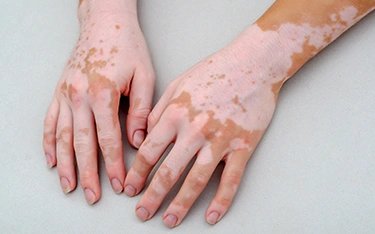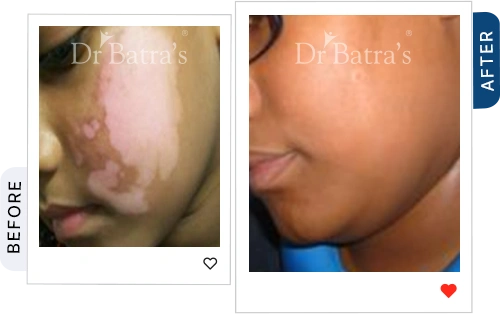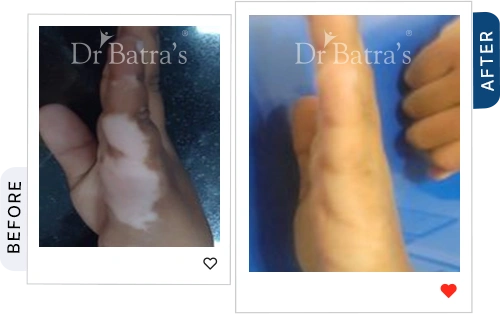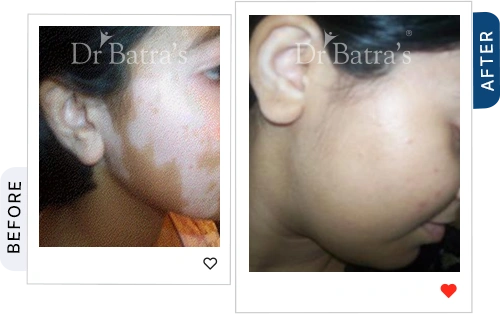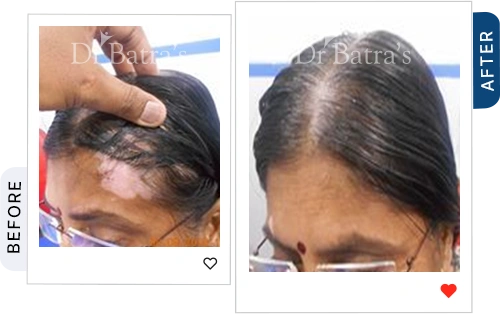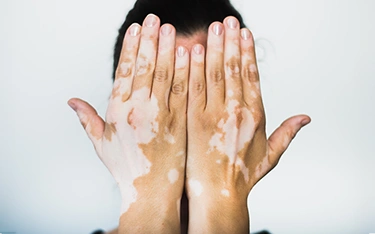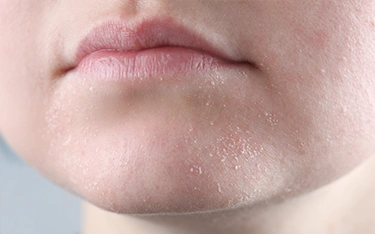Vitiligo, also known as leucoderma, is a skin condition where melanin-producing cells (melanocytes) are destroyed, leading to pale or milky-white patches on the skin. It affects individuals physically and emotionally, often causing low self-esteem, social stigma, and psychological distress. A government-affiliated study reports vitiligo prevalence in India ranges from 0.25% to 4%, with some regions like Gujarat and Rajasthan reaching up to 8.8%.
Dr Batra’s® treats vitiligo with personalised homeopathy that addresses the root cause, supporting melanin cell regeneration and emotional well-being. Combining advanced diagnostics, targeted homeopathy treatment for vitiligo, and lifestyle guidance, treatments are safe, side-effect-free, and deliver long-lasting results, helping patients restore skin health and regain confidence.
5 Things to Know About Vitiligo Disease
- Vitiligo is Not Contagious
Vitiligo cannot be passed from one person to another. It does not spread through touch, saliva, blood, or shared personal items like towels and swimming pools. Myths associating vitiligo with touching white-spotted animals or sharing food are completely false.
- Vitiligo Has No Relation to Past ‘Karma’
One widespread misconception is that vitiligo is a punishment for past wrongdoings. However, scientific research shows that vitiligo is caused by autoimmune, genetic, and environmental factors, leading to the destruction of melanin-producing cells.
- White Foods Do Not Cause Vitiligo
Many people believe that eating milk, fish, citrus fruits, or white-colored foods triggers vitiligo. This is a myth. Vitiligo is an autoimmune disorder, not a result of dietary choices.
- Vitiligo Does Not Affect Intelligence
Vitiligo only affects skin pigmentation, not brain function or intelligence. People with vitiligo lead normal, healthy lives and have no cognitive or physical impairments.
- Vitiligo is Not Related to Skin Cancer or Leprosy
Vitiligo is not linked to skin cancer or leprosy. Unlike albinism, where melanin is absent from birth, vitiligo occurs due to the destruction of melanocytes over time.
Dr Batra’s® pro tip:
Carry a broad-spectrum sunscreen in your bag, apply it every 3 hours. This simple habit protects depigmented skin and slows vitiligo progression
Is Vitiligo an Autoimmune Disease?
Yes, vitiligo is classified as an autoimmune disease. The body’s immune system mistakenly attacks healthy melanocytes, leading to loss of skin pigmentation.
Vitiligo affects people of all skin types, but it is more noticeable in individuals with darker skin tones. While it does not affect overall health, it can cause emotional distress and self-esteem issues.
Signs of Vitiligo:
- Patchy loss of skin color in different body parts
- Premature graying or whitening of hair on the scalp, eyebrows, or beard
- Loss of color in the inner lining of the mouth and nose
Vitiligo Causes
The exact cause of vitiligo is still unknown, but possible triggers include:
- Autoimmune disorders : The immune system attacks melanocytes, causing pigmentation loss.
- Genetic predisposition : A family history of vitiligo may increase the risk.
- Oxidative stress imbalance : Free radicals damage melanocytes.
- Skin trauma or sunburn : Injuries may trigger vitiligo in some individuals.
- Harmful chemical exposure : Certain chemicals in skin-care products can contribute to vitiligo.
- Associated conditions : Vitiligo is linked to thyroid disorders, diabetes, alopecia areata, and psoriasis.
Vitiligo and Mental Distress
Vitiligo can negatively impact self-confidence and emotional well-being. Many individuals experience:
- Embarrassment and social anxiety
- Depression, sadness, or mood swings
- Isolation due to fear of judgment
- Stress, which can worsen vitiligo
Support groups, counseling, and self-care practices can help individuals cope with the psychological effects of vitiligo.
Is Vitiligo a Contagious Disease?
Vitiligo is not a contagious disease. Many people wonder, “is vitiligo contagious?” or “is vitiligo communicable?, the answer is no. It does not spread from one person to another, and it cannot be passed through skin contact, sharing food, or close interaction. In fact, vitiligo does not spread by touch; it is an autoimmune condition where the immune system affects pigment-producing cells.
